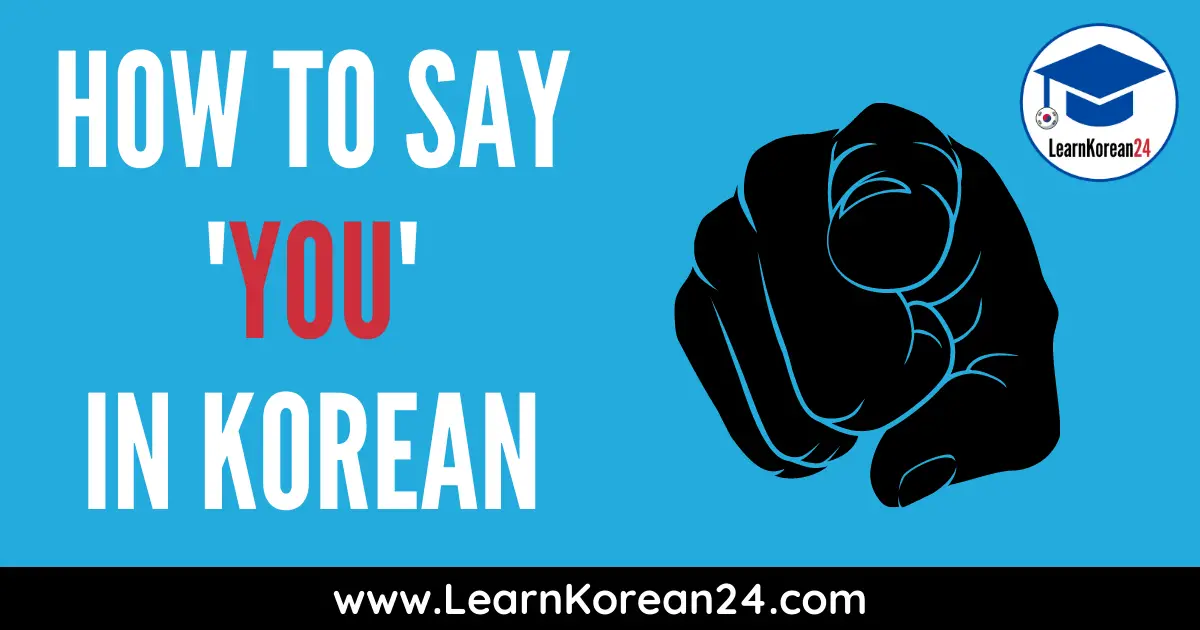How To Say ‘You’ In Korean
The word ‘you’ in Korean is something Korean learners have difficulty with. As with many things in the Korean language, there are different ways to say ‘you’ in Korean and the particular one you use depends on whether your using written or spoken language and the situation you are using it in. In this lesson, you will learn the different ways to say ‘You’ in Korean and which one to use in different situations. Let’s get started.
You In Korean
Before we look at the different ways to say ‘you’ in Korean, it is important to note that ‘you’ is not used in the same way as it is in English. In English, it is very common to use ‘you’ (e.g. Where are you going?, Are you okay?, etc), but in Korean saying the word ‘you’ like this is too direct and may actually sound rude. For that reason, in Korean when someone wants to say ‘you’, usually they use the person’s title or their name followed by a honorific suffix. With that being said, let’s look at the different ways to say ‘You’ In Korean.
당신 [dang-sin]
Although, 당신 translates as ‘you’ in Korean, you will almost never need to use this word in spoken language. In fact, if you do say 당신 directly to someone, you can actually sound rude and even aggressive. 당신 is generally only used in written language in literature, poetry, and song lyrics. When used in songs and poetry, often it is used to say ‘you’ in a romantic or endearing way.
너 [neo]
너 is the informal/casual way to say ‘you’ in Korean. As this is casual way, you should be careful to only use this word to say ‘you’ with people you are close friends with or those much younger than you. Otherwise, you will sound disrespectful.
그대 [geu-dae]
Like 당신, 그대 is not really used in spoken language. 그대 is usually only used in written language to say ‘you’ in Korean in a romantic or endearing way. Some common ways to use 그대 are 그대여 (dear you), 그대와 함께 (with you), and 그대에게 (to you).
자네 [Ja-ne]
자네 can be used to say ‘you’ by elderly people to address people much younger than them.
아저씨 [a-jeo-ssi]
아저씨 is used to address a middle-aged man, and can function as the word ‘you’ in Korean. For example, if you wanted to say “Where are you going?” to a middle-aged man, you can say “아저씨는 어디 가세요?”.
아줌마 [a-jum-ma]
아줌마 is used to address a middle-aged woman, and can function as the word ‘you’ in Korean. For example, if you wanted to say “Where are you going?” to a middle-aged woman, you can say “ 아줌마는 어디 가세요?”.
Use The Person’s Title
A common way to say ‘you’ in Korean in spoken language is to use the person’s title. For example, if you are talking to a teacher you would say 선생님, if you’re talking to a doctor you would say 의사 선생님, etc.
Name + 씨
Another common way to say ‘you’ in Korean is to use the person’s name followed by the honorific suffix 씨. For example, to say ‘Where are you going?’ to someone named ‘수민‘ you can say ‘수민 씨는 어디 가세요?
Example Sentences With ‘You’ In Korean
As was mentioned above, the most common ways to use ‘you’ in Korean is to simply use the person’s name followed by the honorific suffix 씨 or to use the persons title. Here are some example sentences using these ways to say ‘you’. The word that functions as ‘you’ is in bold.
- 수민 씨는 어제 뭐 했어요? = What did you do yesterday, Sumin?
- 선생님 수고하셨습니다. = Teacher, you worked hard.
- 너는 어때? = How about you?
- 동현 씨 오늘 행복해 보여요. = You look happy today, Donghyun.
STUDY ONLINE WITH KOREAN ARAH!
Ready to take your Korean to the next level?
Get One-on-One Korean lessons from a qualified and experienced Korean language tutor!

